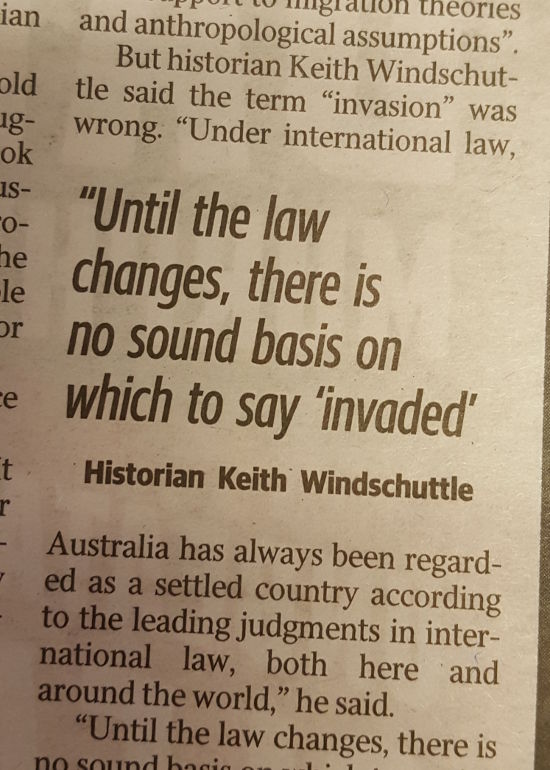The Daily Telegraph Accuses UNSW Of “Rewriting History” For Saying Australia Was “Invaded”
But...he did?

Whether it’s encouraging the marginalisation of vulnerable LGBTI schoolkids, comparing the ABC to ISIS or declaring war on all sharks, Sydney’s Daily Telegraph is occasionally given to frothing-at-the-mouth fury over things that really don’t justify it.
The latest target of the Tele‘s white-hot, constantly screeching ball of rage is the University of New South Wales. If you haven’t seen the Tele this morning, congratulations on making sound life choices, first of all. But more pertinently, your racist uncle broke into the Tele‘s offices last night and redid the front page to look like this:
“The University of NSW wants to rewrite our nation’s history to scrub out Captain Cook’s contribution by saying he didn’t ‘discover’ Australia — he ‘invaded’ it,” the Telegraph breathlessly reports with a fairly profound misunderstanding of what the word “whitewash” means in historical terms.
“Invasion of the history rewriters: nutty professors want to Cook the record books,” yells the clearly agitated and dehydrated follow-up story on page seven. “Students at a leading Australian university are being told to refer to Australia as having been ‘invaded’ instead of settled”, and “are also told it is offensive to suggest James Cook ‘discovered’ Australia”. Presumably ‘History students encouraged to describe history accurately when they write about it’ was canned as a potential headline because it isn’t snappy enough.
True to form, the Tele‘s line has already been recycled by the Daily Mail, Channel 7’s Sunrise and Channel 9’s Today Show, ensuring this latest bout of nation-crippling left-wing mischief reaches its key target audience: angry internet commenters named Norm. The story also drew the ire of KIIS FM’s Kyle Sandilands this morning, who went on one of his trademark verbal diarrhoeas against the “wankers” at UNSW trying to “rewrite history”. At the time of writing, the space-time continuum somehow still hasn’t imploded from the irony of Kyle Sandilands calling someone else a wanker.
UNSW attempts to re-write Australian history, asking students to say AUS was “invaded”, rather than “discovered”. https://t.co/OznFpvhRhA
— The Today Show (@TheTodayShow) March 29, 2016
The thing all these outlets are missing is so obvious it feels almost patronising to point it out — Australia wasn’t ‘discovered’ by James Cook at all if you count the roughly 800,000 people living here when he arrived, and their millions of ancestors, as people. Australia was, in fact, invaded by Britain in the 1780s, and that moment has defined post-invasion Australia ever since. As the Aboriginal Heritage Office notes, the white colonisers’ refusal to acknowledge the reality of Australia as occupied land starts from the moment they first encountered it and invoked the legal fiction of ‘terra nullius’, or “land belonging to no one,” to justify their seizure of it.
But it’s worth focusing on the UNSW resource that’s attracted so much ire. The UNSW Diversity Toolkit recommends that students and teachers refrain from describing Captain Cook as the person who “discovered” Australia, recommending instead that he be referred to as “the first Englishman to map the east coast of ‘New Holland'” — in other words, to accurately describe the things he did and the context in which he did them.
Other recommendations in the Toolkit — and, contrary to the line pushed in the Tele, recommendations is all they are — include dangerous, politically correct ideas like not referring to Aboriginal people as “coloured,” “mulattos” and “octoroons”, not describing Indigenous cultures as “primitive” or “simple”, and calling Uluru ‘Uluru’ instead of ‘Ayers Rock’. This practice of naming things by their actual names, instead of by racist, bogglingly misguided terms dreamed up by white guys in puffy shirts in the 1800s, is about as ideological as the Toolkit gets.
Which is more than can be said for the Tele. In an effort to paint a picture of decent, hardworking historians horrified at UNSW’s supposed historical perfidy, the reporter in question could only dig up a quote from Keith Windschuttle, a controversial historian who’s devoted much of his career to retrospectively justifying European actions in post-invasion Australia and downplaying the death and destruction wreaked on Aboriginal nations from 1788 onward. Windschuttle came to prominence in the History Wars of the 1990s and was a favourite of John Howard during the former PM’s tireless quest to erase Aboriginal Australia from our understanding of our own history. Windschuttle’s work has been widely criticised and discredited by historians, commentators and others.

If you’re still unconvinced of the Diversity Toolkit’s harmlessness, you can read the entire thing here, because it’s been freely available online since at least September 2015. In keeping with the spirit of the story, the Telegraph‘s reporter “discovered” UNSW’s Diversity Toolkit in the same way Captain Cook “discovered” Australia — they stumbled across something used by thousands of people for a very long time, but are still extremely eager to take credit for finding it.
For what it’s worth, I wouldn’t have minded this kind of “brainwashing” when I was growing up. I distinctly remember being taught in primary school that Australia is the only inhabited continent that’s never had a war fought on it — an angle which conveniently overlooks the Frontier Wars, the armed conflicts waged between the British and Aboriginal nations across the country for around 50 years. Nor did I learn about Aboriginal resistance fighters like Pemulwuy, who waged war against the British for more than ten years around Parramatta, or Yagan, the charismatic Noongar man who resisted the Swan River Colony in the 1830s.
Nor, I’ll hazard a guess, do most of the people so upset at UNSW today. Unless you seek one out at university, getting even a basic understanding of Aboriginal history is pretty difficult. Given the attitudes of the Tele, Sandilands and others, resources like the UNSW Diversity Toolkit could use some wider dissemination.


